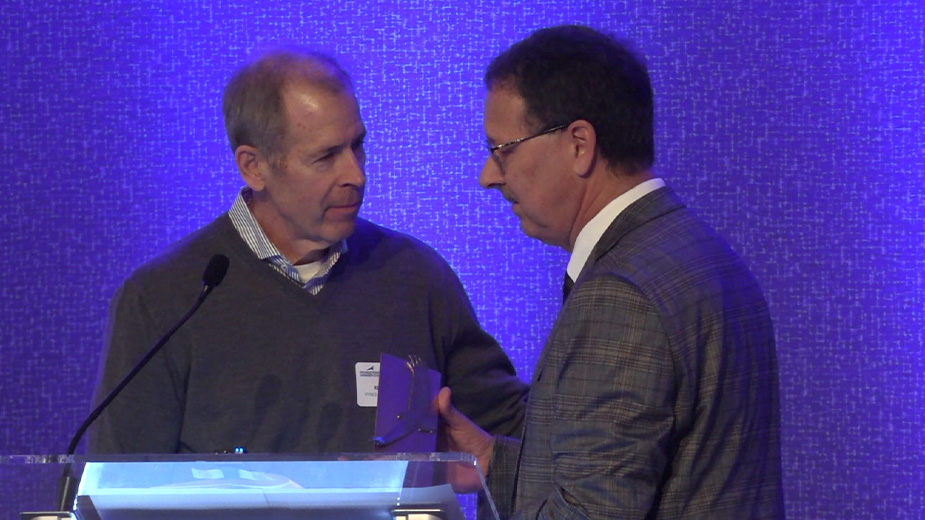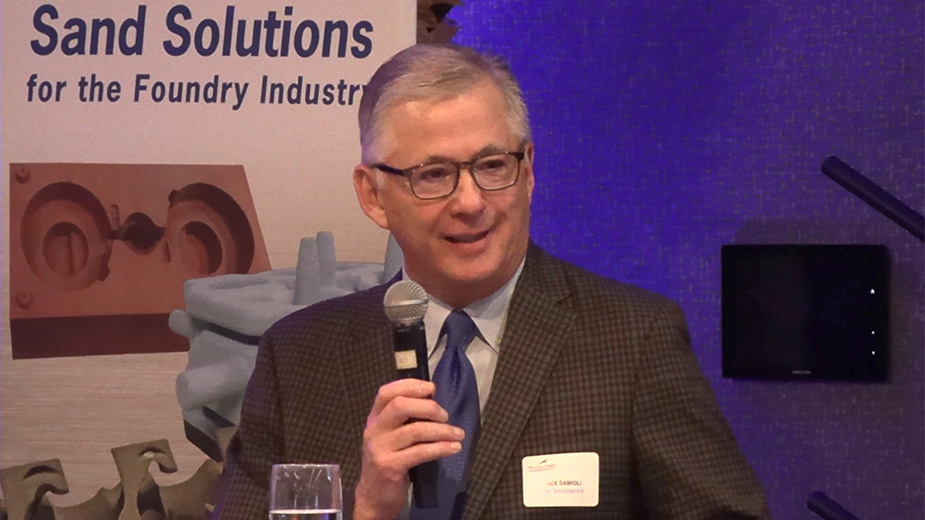Economist Shares Insights on Post-Covid Economy
NILES, Ohio – A First National Bank economist sees a U.S. economy that is on the road to normal following the Covid-19 pandemic and opportunities for growth in the Mahoning Valley because of comparatively low housing costs.
David Valentiner, managing director of interest rate management for F.N.B., was the featured speaker at the Youngstown/Warren Regional Chamber’s Economic Forecast Breakfast. Approximately 400 area business leaders attended the event, which was held at the Eastwood Event Centre on Thursday.
“I actually think we have a very good shot at having a soft landing because the economy has stayed so strong through the past several years,” Valentiner said.
Today’s economy has “been driven by changes that started four years ago,” and things are starting to return to normal, he said.
The economy is now readjusting as the effects of the relief provided during the pandemic, including the direct financial economic stimulus provided early on and the pause of student loan payments until last month, come out of the system.
“Inflation has been the single largest issue that came out of the pandemic, because we didn’t deal with it for 40 years, and it’s what groups like the Federal Reserve have been trying to combat,” he said. Two years ago, inflation had reached 9%, and fighting it was the top priority. Now inflation is at 2.4%.
The economy is growing at 2.8%, down slightly from 3% earlier this year and from 3.4% from the last quarter of 2023. He expects growth to remain at a pace that is “more sustainable” to keep inflation continuing to moderate.
“The economy has been strong. It certainly slowed down a little bit from last year, and we’ve seen consumer spending get a little bit tighter. But we did need that to happen to keep inflation under control,” he said. “But it’s not falling off a cliff. It’s not something where the outlook has turned negative. It’s just slowed down to a more sustainable pace.”
The country also is facing issues caused mainly by retirements of baby boomers, leaving the economy about 5 million workers short. After peaking around 1957 at nearly four children per family, the birth rate dropped precipitously in the years that followed and is at about 1.6 children per family today, reducing the pool of available replacements for those retiring workers.
“You need about 2.1 children per family to maintain a level population, assuming no immigration or migration in or out,” he said.
One of the factors affecting inflation is the reemergence of pricing pressure in a way that hadn’t been seen in a generation. “We have so many people working, it’s almost too much for our economy to handle, and that’s going to raise prices,” he said.
Wage growth of about 3% is low enough that businesses don’t normally have to raise prices to adjust for that. “Once wages started growing 4%, 5%, 6% a year, that becomes very difficult for businesses not to begin to raise prices,” he said.
While still coping with the effects of Covid, the economy also is having to deal with the “sins of 2008 in terms of our housing stock,” he said.
“We are constructing right now in this country the same number of homes we were constructing in 1995. The problem with that is that the population was only 260.5 million in 1995, and today it’s about 335 million. So that’s about 75 million new people, and we’re still building the same number of homes,” he said. “Construction spending never got where it was until we got past the pandemic.”

Valentiner was optimistic about prospects for the local economy based on local housing affordability.
“You are one of the few communities that really does have both the vibrant business community, and you still have an affordable market in terms of housing,” he said. In Los Angeles, a monthly payment costs about 90% of what the average person makes there.
According to United Nations projections, the Valley’s population is on track to grow every year through 2030 because of the efforts of the local economic development team, said Guy Coviello, the Regional Chamber’s president and CEO.
“Someone smarter than me about this stuff once told me – and I wholeheartedly believe this – economic development is the ultimate team sport,” he said. He also reported that Ultium Cells has surpassed Youngstown Air Reserve Station as the largest employer in Trumbull County.
Coviello also said the chamber and its partners would be making several announcements over the next few months. Those will include announcements of a comprehensive housing strategy, with a goal of pumping more than $100 million into the local economy; a series of programs to “cultivate the next generation of corporate leaders” to help overcome the challenge of impending retirements by the baby boom generation; and trade opportunities with Vietnam and Iceland to help grow exports by 2% by 2030.

The breakfast event also featured two award presentations. The chamber recognized Jack Damioli, president and CEO of the Broadmoor Resort, with the 2024 Valley Champion Award. The Manufacturing Advocacy and Growth Network – better known as Magnet – presented Hynes Industries with the Excellence in Manufacturing Award.
Based in Youngstown, Hynes Industries manufactures metal-fabricated parts, principally through roll forming but also using capabilities that include robotic welding, punching and brake pressing.
The company is celebrating 100 years in business, a milestone it achieved, first and foremost, because of its people, as well as how the company has committed to meeting the needs of its customers, CEO Rick Organ said.
“It’s a very rare occasion when Heinz ever loses a customer. Once we have secured you as a customer, we tend to have you for life. And that’s because of the way we take the time to care for them, the level of service that we provide,” Organ said. “We are very much involved with our customers at the very outset, helping them better define their needs and coming up with a solution that best suits their requirements, but at the same time is well-suited to our manufacturing capabilities.”

Damioli, a Brookfield native who has been president and CEO of the Broadmoor Resort in Colorado Springs, Colo., since 2021, shared how his years working at Yankee Run Golf Course, starting with shagging balls at age 10 for the course’s golf pro, helped him in his career.
“We’re in a relationship business, and we achieve what we achieve as a result of 2,100 people working together,” Damioli said. Among the additions made at Broadmoor since he joined the resort in 2014 are three “boutique camps,” including one at the summit of Cheyenne Mountain, a ranch surrounded by Pike National Forest and a private fly-fishing camp.
Pictured at top: David Valentiner, managing director of interest rate management for First National Bank.
Copyright 2024 The Business Journal, Youngstown, Ohio.


